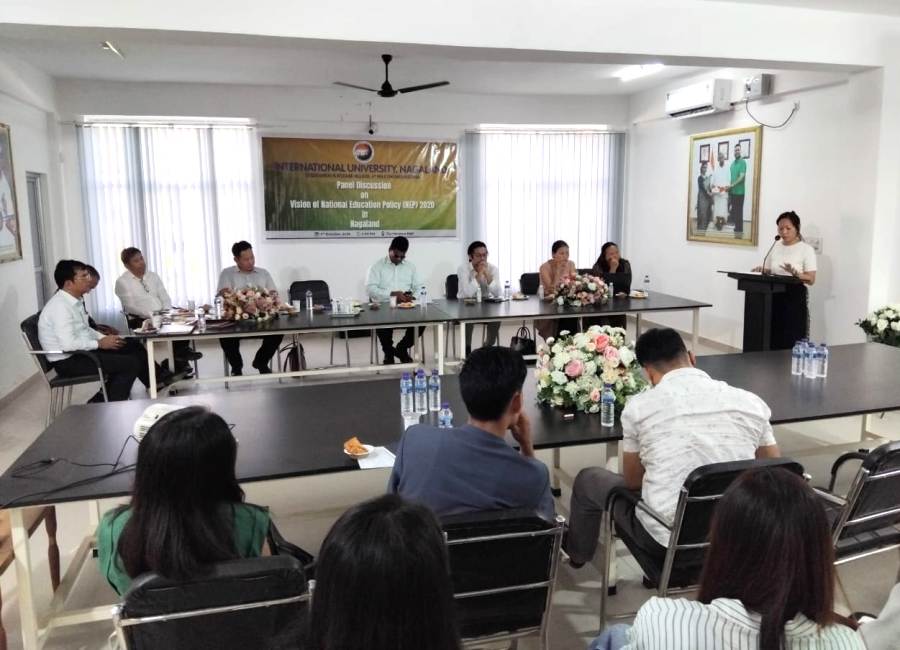Experts discuss NEP 2020 in Nagaland, highlighting curriculum reforms, multidisciplinary learning, and challenges in higher education.
Share

DIMAPUR — Nagaland’s higher education system must strategically adapt to the National Education Policy (NEP) 2020, experts said during a panel discussion at International University in Chümoukedima on Friday.
Dr. Vinyühu Lhoungu, Associate Professor at Dimapur Government College, said that NEP 2020 empowers institutions with significant autonomy, including the ability to design their own curricula.
“We have developed several curricula approved by the university. This flexibility allows colleges to tailor courses to local needs,” he said.
Dr. Lhoungu added that the current FYUGP curriculum under Nagaland University may not adequately prepare graduates for competitive exams.
“Curricula must be strengthened to enhance students’ skills and knowledge, preparing them for future success,” he suggeested.
Also read: Nagaland survey pegs unemployment at 16%, highlights skill gap and migration trends
Highlighting implementation challenges, Dr. Yelhi Vero, Assistant Professor at Dimapur Government College, said that large Higher Education Institutions (HEIs) require significant effort, management, and investment. “Most colleges in Nagaland have fewer than 1,000 students, and 16 institutions report enrolments below 100,” he said.
Vero pointed out that most colleges are single-stream institutions with limited courses and disciplines. Funding is another major constraint, he said, as higher education receives only about 1% of the state budget.
Rural colleges struggle to attract students due to poor infrastructure, limited courses, and faculty shortages, while private institutions face financial pressures that affect affordability, he pointed out.
Read more: Government taking steps to boost technical education for youth—TR Zeliang
Online accreditation systems may also add administrative stress, diverting attention from academics, he said.
Vero suggested several strategies for multidisciplinary and research-oriented HEIs: introduce add-on courses focusing on local and traditional relevance; develop institution-specific courses complementing UGC programmes; strengthen IT and communication infrastructure; promote faculty upskilling in new teaching and learning technologies; encourage autonomous status for more colleges; and grant freedom for diverse postgraduate programmes.
Dr. Kevizonuo Kuolie, Assistant Professor and Associate Dean at ICFAI, said that NEP 2020 is a student-centric policy, designed to empower students to make informed choices.
She maintained that NEP 2020 encourages multidisciplinary learning. Arts students can acquire technical skills, and science students can pursue creative writing. “This holistic approach blurs the lines between conventional courses and professional interests, fostering entrepreneurial and critical thinking skills across disciplines,” Dr. Kuolie said.
Read from our Education series: Bees and Business: Insights from the founders of JOME Foods
Dr. Vinoth of St. Joseph University identified practical implementation challenges in Nagaland, including infrastructure gaps, faculty shortages, overreliance on government funding, minimal research output, and weak industry engagement, limiting internships and skill-based training.
He also highlighted cultural and linguistic diversity, with multiple tribal languages and English dominance, which complicates curriculum design.
He recommended strategies such as strengthening digital infrastructure, conducting regular faculty training workshops, promoting faculty exchange programmes, leveraging public-private partnerships for infrastructure and research funding, expanding scholarships, supporting local entrepreneurship, and integrating tribal knowledge and bilingual education to preserve cultural identity.
Prof. Zavise Rume, Director (Vocational) at International University Nagaland, moderated the session and emphasised the central role of teachers in implementing NEP 2020.
“Anyone who wants to effect change in education must first become a teacher. NEP provisions must be reflected in state policies, particularly recruitment,” he said.